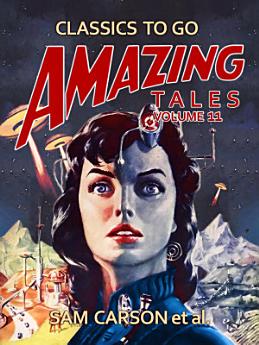Amazing Tales Volume 11
Jan 2025 · CLASSICS TO GO Book 11 · Otbebookpublishing
Ebook
96
Pages
family_home
Eligible
info
reportRatings and reviews aren’t verified Learn More
About this ebook
Embark on an exhilarating voyage through the cosmos with "Amazing Tales Volume 11", a dazzling science fiction anthology masterfully curated by the celebrated Sam Carson. This captivating collection is your portal to universes where the boundaries of imagination are pushed to their limits, delving into themes of rebellion, survival, friendship, and the enigmatic wonders of the universe. Start with Sam Carson's own "Sphere of the Never-Dead", where the delicate balance between destiny and friendship is tested amidst groundbreaking scientific achievements and a haunting presence that refuses to fade. Follow this up with Bertrand L. Shurtleff's "Silence is Deadly", a gripping naval thriller spun into a chilling race against time. As radio silence veils wartime secrets buried beneath the sea, tension rises to a breathtaking crescendo. In "Revolt on the Earth-Star", Carl Selwyn draws readers into the heart of a dystopian struggle, where Rod Carver stands against the icy tendrils of oppression to ignite a revolution. Feel the pulse of hope and resistance as humanity battles for freedom in a meticulously crafted future. Finally, Alexander M. Phillips' "The Space Flame" delivers a cosmic thriller like no other. As a derelict spaceship becomes the stage for mutiny and survival, you'll find yourself enveloped in the vast silence of space, where danger lurks at every turn. For devotees of science fiction, this anthology promises an epic odyssey through cosmic revolts, naval warfare, and interstellar escapades. Each tale offers a kaleidoscope of emotions, from the quiet strength of friendship tested by fate to the electric thrill of rebellion against tyranny. With "Amazing Tales Volume 11", immerse yourself in a rich tapestry of narratives designed to leave you awestruck and pondering the timeless mysteries of the universe. Dive in and let your imagination soar beyond the stars.
About the author
Sam Carson, born in 1972 in the vibrant city of San Francisco, emerged as a literary force whose works have left an indelible mark on contemporary speculative fiction. Growing up during the tech boom, Carson's early fascination with the convergence of humanity and technology became a hallmark of his writing. His narratives often explore the ethical and existential dilemmas posed by rapid technological advancements, earning him a reputation as a visionary thinker.Carson's career took off in the late 1990s, a period marked by the rise of the internet and digital culture. His debut novel, "Digital Phantoms," captivated readers with its prescient depiction of virtual realities and artificial intelligence. This work not only garnered critical acclaim but also influenced a generation of writers who grappled with the implications of a digital future.A figure of controversy, Carson was known for his outspoken views on privacy and surveillance, themes that permeated his essays and public appearances. His 2005 manifesto, "The Transparent Society," sparked heated debates about the balance between security and freedom in the digital age. Carson's willingness to challenge societal norms and question authority made him a polarizing yet respected figure.Beyond his literary achievements, Carson was a mentor to many young authors, fostering a community of innovative thinkers. His influence is evident in the works of contemporary writers who continue to explore the intersections of technology, identity, and morality.Sam Carson's legacy is one of bold imagination and fearless inquiry, making him a pivotal figure in the landscape of modern literature. His contributions continue to resonate, inspiring readers and writers to envision the future with both caution and curiosity.
Rate this ebook
Tell us what you think.
Reading information
Smartphones and tablets
Install the Google Play Books app for Android and iPad/iPhone. It syncs automatically with your account and allows you to read online or offline wherever you are.
Laptops and computers
You can listen to audiobooks purchased on Google Play using your computer's web browser.
eReaders and other devices
To read on e-ink devices like Kobo eReaders, you'll need to download a file and transfer it to your device. Follow the detailed Help Center instructions to transfer the files to supported eReaders.









